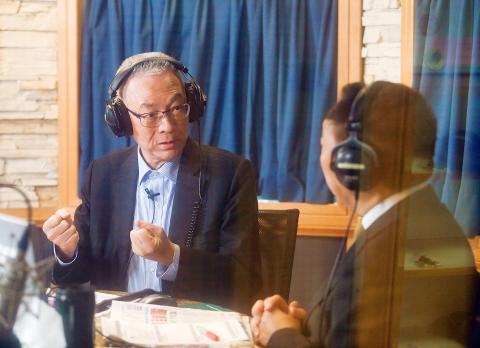Chinese Nationalist Party (KMT) Chairman Wu Den-yih (吳敦義) yesterday said that the KMT could sign a peace treaty with China if it returns to the Presidential Office after next year’s general elections.
Wu made the comments in an interview on morning radio show UFO Breakfast hosted by Tang Hsiang-lung (唐湘龍).
Earlier in the interview, Wu told Tang that the National Unification Guidelines, the implementation of which was suspended by former president Chen Shui-bian (陳水扁), could be reactivated by the KMT.

Photo: CNA
Tang then asked: “If the KMT is again the ruling party after next year’s elections, would and should it usher in a kind of final cross-strait peace treaty?”
“[Former minister of culture] Lung Ying-tai (龍應台) recently wrote that we have waited seven decades for an end to the war,” Tang said. “In a sense, the Chinese Civil War has not ended, because there has been no final peace treaty. Do you think that there should be such a peace treaty?”
Wu said that, according to the Act Governing Relations Between the People of the Taiwan Area and the Mainland Area (臺灣地區與大陸地區人民關係條例), only the government or its authorized institutions can negotiate agreements with China.
“If the KMT has the opportunity to rule again, then we would have met the conditions stipulated by the law,” Wu said.
“Assuming talks between the two sides are successful, a KMT government would be within its rights to sign a cross-strait peace treaty,” he said.
Asked if the party needs to change its cross-strait policy, Wu replied in the negative, saying that the KMT would not shift its position on the so-called “1992 consensus,” which he credited for “years of peace and stability” across the Taiwan Strait.
The “1992 consensus” — a term former Mainland Affairs Council chairman Su Chi (蘇起) in 2006 admitted making up in 2000 — refers to a tacit understanding between the KMT and the Chinese Communist Party that both sides acknowledge there is “one China,” with each side having its own interpretation of what “China” means.
Wu repeatedly refused to answer whether he plans to run for president next year, saying only that he has “a decision to make,” for which he did “not feel certain at present.”
Party unity, the chances of winning and fundraising are issues that he must consider before entertaining thoughts of a run for the presidency, he said.
The public would know his answer when registration for the KMT primary closes in May, Wu said, adding that he might decide not to run.
Separately yesterday, Democratic Progressive Party (DPP) spokesman Johnny Lin (林琮盛) said that “Wu’s so-called cross-strait peace treaty cannot guarantee peace; Taiwan’s sovereignty is the only foundation for building peace and stability.”
“The DPP stands fast in the defense of the sovereign independence of the Republic of China, Taiwan and the values of freedom, democracy and human rights,” he said.
Additional reporting by Su Fun-her

The combined effect of the monsoon, the outer rim of Typhoon Fengshen and a low-pressure system is expected to bring significant rainfall this week to various parts of the nation, the Central Weather Administration (CWA) said. The heaviest rain is expected to occur today and tomorrow, with torrential rain expected in Keelung’s north coast, Yilan and the mountainous regions of Taipei and New Taipei City, the CWA said. Rivers could rise rapidly, and residents should stay away from riverbanks and avoid going to the mountains or engaging in water activities, it said. Scattered showers are expected today in central and

People can preregister to receive their NT$10,000 (US$325) cash distributed from the central government on Nov. 5 after President William Lai (賴清德) yesterday signed the Special Budget for Strengthening Economic, Social and National Security Resilience, the Executive Yuan told a news conference last night. The special budget, passed by the Legislative Yuan on Friday last week with a cash handout budget of NT$236 billion, was officially submitted to the Executive Yuan and the Presidential Office yesterday afternoon. People can register through the official Web site at https://10000.gov.tw to have the funds deposited into their bank accounts, withdraw the funds at automated teller

COOPERATION: Taiwan is aligning closely with US strategic objectives on various matters, including China’s rare earths restrictions, the Ministry of Foreign Affairs said Taiwan could deal with China’s tightened export controls on rare earth metals by turning to “urban mining,” a researcher said yesterday. Rare earth metals, which are used in semiconductors and other electronic components, could be recovered from industrial or electronic waste to reduce reliance on imports, National Cheng Kung University Department of Resources Engineering professor Lee Cheng-han (李政翰) said. Despite their name, rare earth elements are not actually rare — their abundance in the Earth’s crust is relatively high, but they are dispersed, making extraction and refining energy-intensive and environmentally damaging, he said, adding that many countries have opted to

PEACE AND STABILITY: Maintaining the cross-strait ‘status quo’ has long been the government’s position, the Ministry of Foreign Affairs said Taiwan is committed to maintaining the cross-strait “status quo” and seeks no escalation of tensions, the Ministry of Foreign Affairs (MOFA) said yesterday, rebutting a Time magazine opinion piece that described President William Lai (賴清德) as a “reckless leader.” The article, titled “The US Must Beware of Taiwan’s Reckless Leader,” was written by Lyle Goldstein, director of the Asia Program at the Washington-based Defense Priorities think tank. Goldstein wrote that Taiwan is “the world’s most dangerous flashpoint” amid ongoing conflicts in the Middle East and Russia’s invasion of Ukraine. He said that the situation in the Taiwan Strait has become less stable